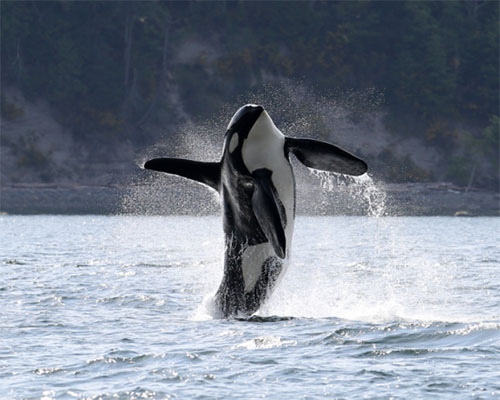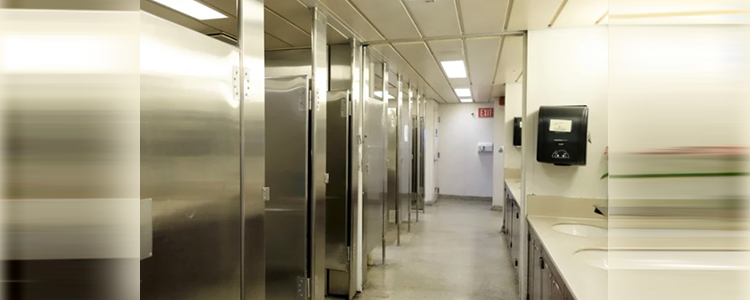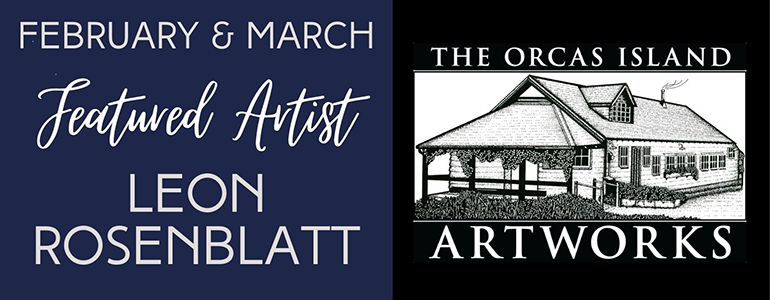— by Margie Doyle —

Despite appearances, Southern Resident Killer Whales are starving due to lack of Chinook salmon. Photo courtesy Dave Eliff
In recent days County Councilman Rick Hughes from Orcas Island has looked at the year ahead and announced his plans and “pipedreams” for the coming year. Relieved to sit back from the chairmanship of the three-person Council, Hughes says he’s re-energized to be an advocate for county residents.
At a recent EPRC meeting, and following the meeting, Hughes outlined his major objectives for 2018.
1) Orca protection and salmon recovery
Hughes says the County is employing a “triangle” of strategies to address Southern Resident Killer Whale protections and King Salmon recovery — stormwater monitoring for toxins; food for fish; and vessel impact.
Recently Hughes met with the Port of Vancouver, B.C. (whose zone is mostly in San Juan County waters), which has implemented a program called ECHO (Enhancing Cetacean Habitat and Observation). “ECHO is a Vancouver/Fraser Port Authority-led initiative aimed at better understanding and managing the impact of shipping activities on at-risk whales throughout the southern coast of British Columbia. “The long-term goal of the ECHO Program is to develop mitigation measures that will lead to a quantifiable reduction in potential threats to whales as a result of shipping activities. ” (from www.portvancouver.com/environment/water-land-wildlife/marine-mammals/echo-program/ Hughes spoke of the ECHO initiative whereby commercial boats will slow down 5-11 knots, and said this program has resulted in 61% voluntary compliance and 44% reduction in underwater sound. This makes marine transport safer and also produces less underwater noise, which is harmful to the Orcas.
Also relating to Southern Resident Killer Whale sustainability, Hughes is seeking guaranteed long-term funding for Glenwood Springs Salmon Hatchery, which puts 800,000 Chinook (King) Salmon into East Sound. Ken Balcomb, Executive Director of the Center for Whale Research has said, “Our orcas need Chinook salmon to survive. If salmon numbers don’t improve, the whales will be in serious trouble. We could lose them forever.”
Annual funding to Glenwood Springs from the Washington State Department of Fish and Wildlife has decreased by $50,000 this year. The county has provided $10,000 in 2018 funding through the Lodging Tax funds.
Hughes expects to propose a County Southern Resident Killer Whale Ordinance to further enhance Orca Whale Protections. Such an ordinance would ask for a voluntary slowdown of vessels, similar to B.C.’s ECHO program, with permits for whale watch companies and a per-head fee which would fund a Natural Resources deputy to patrol local waters and enforce protection of Orcas.
He is also asking State Governor Jay Inslee to put a county resident on the Southern Rresident Killer Whale Committee.
For further information on the Killer Whale – Salmon recovery situation, please read https://theorcasonian.com/currently-critically-endangered-orca-population-heads-toward-extinction/
2) Trails
“Trails will be a big agenda item for me for next year” said Hughes. On the list for trail development are a trail from Eastsound to the Ferry Landing as part of the Orcas Road project; an offshoot could be a trail from Fowler’s Pond to Deer Harbor. “There could be eight miles of off-road trail,” Hughes says.
He notes there are plans for three miles of trails that could go almost all the way from Spring Point to Four Winds camp, “with help from community access grants.” Deer Harbor also received funding from the County’s Lodging Tax awards in 2018.
3) Eastsound recreation area
Hughes envisions expansion of a public recreation area north of the school to Mount Baker Road. With the anticipated school track, Park and Recreation courts and ball fields, Off-Leash Dog Park and Land Bank Trails, Hughes thinks it’s entirely possible to create “just a killer recreation area.”
Similar plans are underway to make Jackson Beach on San Juan Island near Pear Point into a 300-400 acre marine recreation area this year.
4) Regional Transportation Connections
Hughes, a member of Whatcom County’s Opportunity Council and “The Farmhouse Gang,” a group of government officials from five counties — San Juan, Island, Snohomish, Skagit and Whatcom Counties — hopes to expand regional transportation connections. He sees the completion of the Park and Ride lot at Orcas Landing as a model for collaboration among local, regional and state agencies.
5) Marine access in Eastsound
Hughes considers how to make the County Dock at Madrona Point a better county facility, perhaps linking it to the mooring buoys authorized in Eastsound. He notes there is no public boat launch from Deer Harbor to Obstruction Pass. The buoy project is funded through Public Works funds, following Hughes’ work with the state legislature in 2015 to consider marine facilities under transportation funds.
6) Orcas Road project
The planned road improvements from McNally to Nordstorm lanes will begin as soon as property right-of-ways are obtained, Hughes says.
Of course there are other items on his plate as County Councilman and county liaison for many committees. Hughes says, “My goal is for the county to be considered an advocate.” He feels that county government has improved in that it is more responsive to the community; it has reached out beyond its natural “insular” concerns; and it is more civil in airing disagreements.
Key to those accomplishments, in Hughes’ perspective, is that “Governance should be about balance, not about winning.”
As an example, regarding Orca protection, he says that a warning system with buoys to warn people when whales are feeding makes more sense than a “no-go” zone around marine areas.
He champions local sovereignty, and clarifying that perspective, he says, “We’re so small we can implement ideas and see if they work. I think that local jurisdictions should solve problems locally, rather than looking to the state or federal government.”
“It can’t be all or nothing, that’s not fair to people”
Further, he says, “We need to be better partners outside of our community — even if we have nothing to gain. We can all bring things to the table to help each other — health care, Veterans services, marine protection. The only way to be successful is working with other government entities such as Transportation, Parks, Natural Resources. That way we can plan sensibly for the long term.”
Toward that end, Hughes is available at rickh@sanjuanco.com. He hopes to interact with many Orcas Islanders at a Town Hall in February.
**If you are reading theOrcasonian for free, thank your fellow islanders. If you would like to support theOrcasonian CLICK HERE to set your modestly-priced, voluntary subscription. Otherwise, no worries; we’re happy to share with you.**








